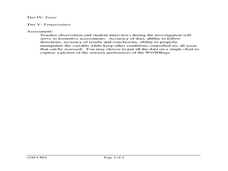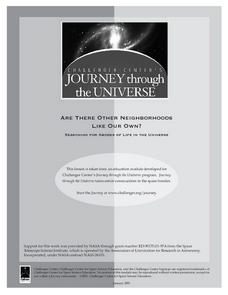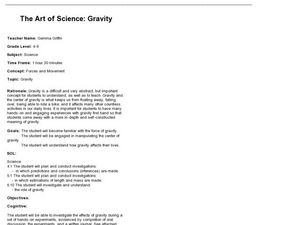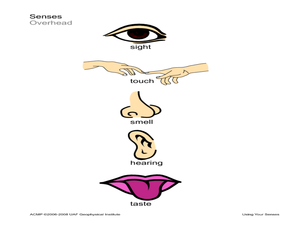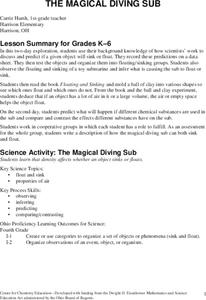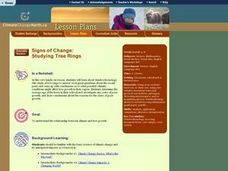Curated OER
Chapter 1: The Science of Biology
Provide young biologists with everything they need to excel in the study of lymphatics, the nervous system, hormones, cellular division, and more! Pupils utilize the workbook, complete with end-of-chapter assessment worksheets, to...
Curated OER
Science Fair With An Energy Efficiency Flair
In order to learn more about energy conservation, pupils work to promote energy efficiency by participating in a school-wide science fair with an emphasis on energy conservation. In addition to displaying their projects, learners invite...
Curated OER
Missing Macroinvertebrates - Stream Side Science
Field study groups collect samples of stream water and identify the macroinvertebrates found. Using their data, they calculate a water quality index to rate the health of the stream. They graph their data and discuss the value of a water...
NOAA
Journey to the Unknown
What's it like to be a deep-sea explorer? Tap into the imaginations of your fifth and sixth graders with a vivid instructional activity, the second part of a six-part adventure. Learners close their eyes and submerge themselves in an...
Science 4 Inquiry
The Ups and Downs of Populations
Life has its ups and downs ... especially if you're an animal! Biology scholars engage in a population study through an inquiry-based lesson. Pupils work together to explore the factors that affect deer populations, then examine the...
California Academy of Science
Human Evolution
As the great and hilarious Tim Minchin once said, "Science is simply the word we use to describe a method of organizing our curiosity." Science is more than just a guess; it is based on questions, observations, and evidence. High...
Curated OER
Frost Depth Study
Learners complete activities to study the frost and frost depth. In this frost study lesson, students use frost tubes to study and measure the frost at their school. Learners measure the frost in the tube and enter their data online to...
Curated OER
Ornithology and Real World Science
Double click that mouse because you just found an amazing lesson plan! This cross-curricular Ornithology lesson plan incorporates literature, writing, reading informational text, data collection, scientific inquiry, Internet research,...
Curated OER
The Nature of Science and Technology
Second graders perform a variety of experiments to observe, form conclusions, and make inferences. In this experiment lesson, 2nd graders experiment based on the result of a pre-assessment. Students share what they have learned.
NOAA
History's Thermometers
How is sea coral like a thermometer? Part three of a six-part series from NOAA describes how oceanographers can use coral growth to estimate water temperature over time. Life science pupils manipulate data to determine the age of corals...
NASA
The Big Climate Change Experiment Lesson 3: Climate Change Lines of Evidence
Consider the preponderance of evidence when making a verdict. The third of five lessons in Unit 1: The Big Climate Change Experiment focuses on the evidence for climate change. Learners study graphs, diagrams, and pictures regarding...
Curated OER
Fossil Inferences
Fourth graders use their knowledge about fossils to arrange fossil pictures in sequence from oldest to youngest. They explain how fossils can be used to make inferences about past life, climate, geology, and environments and discover...
Curated OER
Observations and Inferences
Students observe how to distinguish observations form inferences. In this examining inferences lesson plan students list observations relating to the activity and discuss the importance of them.
Ocean Explorer
Looking for Clues
Upper graders become "shipwreck detectives" by studying the debris field from a shipwreck in the Aegean Sea which took place in the 700s. A website is accessed that gives specific information about the debris field, and pairs of...
Curated OER
Sending Messages to Space
Students interpret a message sent to space using a radio telescope and draw inferences from the interpreted message. Working with a partner, they interpret data that scientists believe is a message from aliens. They work on organizing...
NOAA
Off Base
How does carbon dioxide affect the world's oceans? The final installment in a series of six lessons has pupils research ocean acidification, then conduct an experiment to witness the delicate balance that exists in our seas. Materials...
NASA
Let's Investigate Mars
Take your science class on a hypothetical field trip to Mars with an engaging astronomy lesson. After first learning about NASA's Mars rover missions, young scientists plan their own scientific investigations of Earth's...
NASA
Measuring Solar Energy During an Eclipse
Don't leave your classes in the dark! An inquiry-based lesson has young researchers analyze the light intensity before, during, and after a solar eclipse. They use their data to make inferences about the solar energy available during...
Curated OER
The Art of Science: Gravity
Through a series of experiments and demonstrations, fifth graders will learn about gravity. They will make predictions, drop various objects, write down their observations, and try to understand gravity through balance. This lesson plan...
Curated OER
Using Your Senses
Students make observations. In this sensory skills lesson, students use their senses as well as tools that sharpen their senses to make observations regarding foods and other items.
Curated OER
3-2-1 Pop!
Young scholars investigate how rocket liftoff demonstrates Newton's Laws of Motion. They participate in a class discussion, and construct a rocket powered by the pressure generated from an antacid tablet reacting with water.
Curated OER
The Magical Diving Sub
First graders discuss and predict if a given object sinks or floats. They record their predictions on a data sheet. Pupils test the objects and organize them into floating/sinking groups. Students observe the floating and sinking of a...
Curated OER
Signs of Change: Tree Rings
Students identify and experiment with dendrochronology (the study of tree rings to answer ecological questions about the recent past) and come up with conclusions as to what possible climatic conditions might affect tree growth in their...
NASA
The Discovery of Jupiter Radio Waves
Lead your class on a journey to the planet Jupiter and provide them with fun facts in the process. Learners explore radio waves emitted by Jupiter to further understand how this data helps our daily lives. They conclude by discussing...








